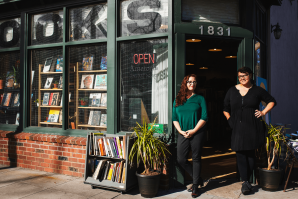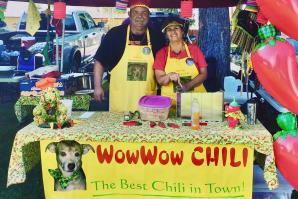By the end of 2018, Sacramento’s restaurant industry was reeling. That year, close to 20 industry workers — servers, chefs, bartenders and others — died from suicide or behaviors related to drug or alcohol use. In the last month of the year alone, four workers lost their lives.
Patrick and Bobbin Mulvaney, owners of Mulvaney’s B&L restaurant in midtown Sacramento, were mourning the loss of many friends and colleagues. Some deaths in particular hit very close to home. In May, Noah Zonca, a popular chef and a longtime friend of Patrick, died from drug-related causes. A Mulvaney’s employee died on Christmas Eve. Grieving, the couple felt compelled to do something to address what they call a mental health crisis in the restaurant industry.
What makes restaurant workers so susceptible to mental health issues such as anxiety and depression, leading to behaviors such as alcohol and drug abuse? “A restaurant is a fast-paced pressure cooker,” says Bobbin. “It’s literally hot in the kitchen, like 160 degrees. When it gets busy and you get in the weeds, it’s very stressful.” The late nights, long hours and uncertain paychecks amp up the pressure.
In early 2019, Bobbin came up with systems to address her employees’ stress. She created a “mental health check-in box” with anonymous, nonverbal communication cards that each worker checked off at the beginning of a shift, noting their mood that day: red for mad, blue for sad, orange for stressed out, green for good. The manager could then take the staff’s temperature and let everyone know at roll call that several people were feeling sad or stressed and needed their colleagues to be kind.
She also devised a 17-question survey with questions like “What stresses you out?” and “What triggers you to drink at work?” She compiled the answers (again anonymously) by subject and attached them to every worker’s paycheck for 17 weeks. The goal: to raise awareness among the staff that everyone struggles with stress.
But the Mulvaneys also wanted to do something for the restaurant community at large. Approaching the end of their long careers, and with Mulvaney’s B&L established as one of Sacramento’s most successful restaurants, they were at the elder-statesman stage of life, ready to put their big hearts and big ideas to work to help others. Patrick was already a national figure in the farm-to-fork movement, traveling to Washington, D.C., to talk to lawmakers about sustainable agriculture and other issues. Bobbin was active with local boards and nonprofits. Both had a wide network of connections with Sacramento’s civic leaders and influencers.
Patrick reached out to mental health experts at Kaiser, WellSpace, NAMI and the National Association of Suicidology to learn more about suicide and its effects on the people left behind. “When chefs threaten to throw themselves on their knives,” he says, “that leaves a scar on the people around them.”
The couple helped start I Got Your Back, a collaboration between local restaurants including Binchoyaki, Selland’s Family Restaurants, The Waterboy, Scott’s Seafood and others to provide support and reduce stigma for restaurant people experiencing mental health issues. The region’s four major health care systems and the Sacramento Kings ponied up mental health resources and funding.
Jacob Gutiérrez-Montoya, founder and artistic director of
Sacramento Contemporary Dance Theatre, teamed up with the
Mulvaneys to create a contemporary dance based on restaurant
life.

Mulvaney himself helps people in crisis by taking them to the emergency room, finding them a safe place to stay or hooking them up with resources for low- or no-cost mental health sessions. If someone is contemplating suicide but doesn’t have a concrete plan, Mulvaney will dial the crisis hotline number, walk the person through a theoretical call, then put the number into the person’s phone for future use.
Bobbin teamed up with Jacob Gutiérrez-Montoya, founder and artistic director of Sacramento Contemporary Dance Theatre, to create a contemporary dance based on restaurant life. The story features three main players, Drunk Chef, Anxiety-Ridden Back Waiter and Pill-Popping Server, along with a supporting cast of dancers playing restaurant colleagues who lift up their co-workers. Called “Behind the Apron,” it was performed several times for live audiences before COVID shut live performances down in 2020.
Gutiérrez-Montoya spent hours at Mulvaney’s, silently observing the restaurant’s employees at work, in order to depict the choreography of restaurant life, from the servers who gracefully flutter linens over the tables to the chef who furtively sneaks a drink from a flask in his jacket pocket. “Patrick cried through it” every time he saw the show, says Bobbin.
Recently, Gutiérrez-Montoya decided to turn “Behind the Apron” into a documentary film, featuring the dance performance intercut with interviews with local restaurant professionals talking about their mental health challenges. He filmed the dance sequences on location inside Mulvaney’s B&L and is still filming the interviews. A sneak peek of the unfinished film was recently presented at The Sofia in Midtown to an audience of restaurant industry people including Brad Cecchi of Canon and Billy Zoellin of Bacon & Butter. It will air on KVIE, probably sometime this summer, and will be available to public television stations around the country.
These days, Patrick and Bobbin Mulvaney are social workers as much as they are restaurateurs, providing mental health first aid to people on the edge. They point people to a Toronto nonprofit, Not 9-5, that publishes a mental health guide for the hospitality industry. Other restaurant owners call them for advice on how to deal with struggling employees.
Patrick was at a ball game when he got a frantic phone call from a fellow restaurateur whose employee was talking about suicide. Mulvaney stayed on the phone, telling him what questions to ask, then talking him through the process of getting help for the employee. These days, he says, it’s all in a day’s work. “As restaurant people, our superpower is hospitality,” he says. “Now, we’re turning it on ourselves.”
Stay up to date on business in the Capital Region: Subscribe to the Comstock’s newsletter today.
Recommended For You

The Great Circle of the Book
OPINION: Independent bookstores are the secret lifeblood of local culture
Independent Bookstore Day is April 27 this year. The owner of one of Sacramento County’s many independent bookstores lets us in on the unique purpose they serve in their respective neighborhoods.

Art Exposed: Muzi Li Rowe
This mixed media artist and photographer explores culture through defunct technology
Whether it’s layers of tiny microchips or rows of dead batteries, each work in Muzi Li Rowe’s Magical Thinking series is like peering into a tiny museum where the most microscopic parts of now-defunct personal technology devices, from old Nokia flip phones to disposable cameras, become individual hallmarks of consumer culture.

Grass Valley Museum Tells Untold History of Women During the Gold Rush
Industrious nuns, international stars and well-educated orphans
In a county known for its wealth of Gold Rush-era museums, undoubtedly some of the most compelling stories from that time reside at a former orphanage hidden within the 160-year-old walls of the Grass Valley Museum.

Art Exposed: Maren Conrad
Meet the Sacramento muralist and designer who creates joyful spaces for women
Maren Conrad reflects on her iconic Sacramento murals and her latest project, the Jacquelyn.

The Chiliheads of Sacramento
National chili competitions are the spice of life for Capital Region retirees — including the founders of Jimboy’s
We’re like a biker gang, but we make chili,” says competitive chili cook Toni Groth, who travels across the country with her husband Mark to fight for the title of World’s Best. Plus, Jimboy’s gives us the chili scoop.



